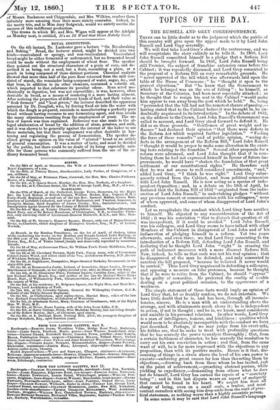ROYAL INSTITUTION.
On the 4th instant, Dr. Lankester gave a lecture "On Breadmaking and Baking." Bread, the lecturer stated, might be divided into two kinds—vesciculated or spongy, and non-vesciculaMd. Vesciculated bread might be either fermented or unfermented, but no fermented bread could be made without the employment of wheat flour. The speaker then pointed out the structural characters of a grain of corn, and de- scribed it as being, not a seed, but a fruit, resembling a plum, or a peach in being composed of those distinct portions. Chemical analysis showed that more than half of the pure flour returned from the mill con- sisted of starch, the remainder being composed of water, sugar, &c., and that bran, in addition to its other elements, contained a volatile oil, which imparted to that substance its peculiar odour. Bran acted me- chanically in digestion, but was not convertible; it was, however, often desirable in bread, as a means of rendering it a more lasting aliment. After noticing the properties of different kinds of food, and their value as "flesh formers" and "heat givers," the lecturer described the apparatus patented by Dr. Dauglish, who, by forcing fixed air into the water with which the dough is prepared, succeeds in manufacturing a perfectly pure bread without having recourse to any fermenting agent, and thus avoids the many objections resulting from the employment of yeast. The ac- tion of leaven was then explained. Reference was also made to the al- leged adulteration of bread by the addition of alum, potatoes, and milk, and it was shown to be generally against the interest of the baker to use these materials, but that their employment was often desirable in has- tening and regulating the process of fermentation. The speaker de- clined giving an opinion on the value of " afirated" bread as an article of general consumption. It was a matter of taste, and must be decided by the public, but there could be no doubt of its being especially suit- able for those persons who commonly suffered from the use of the or- dinary fermented bread.


























 Previous page
Previous page